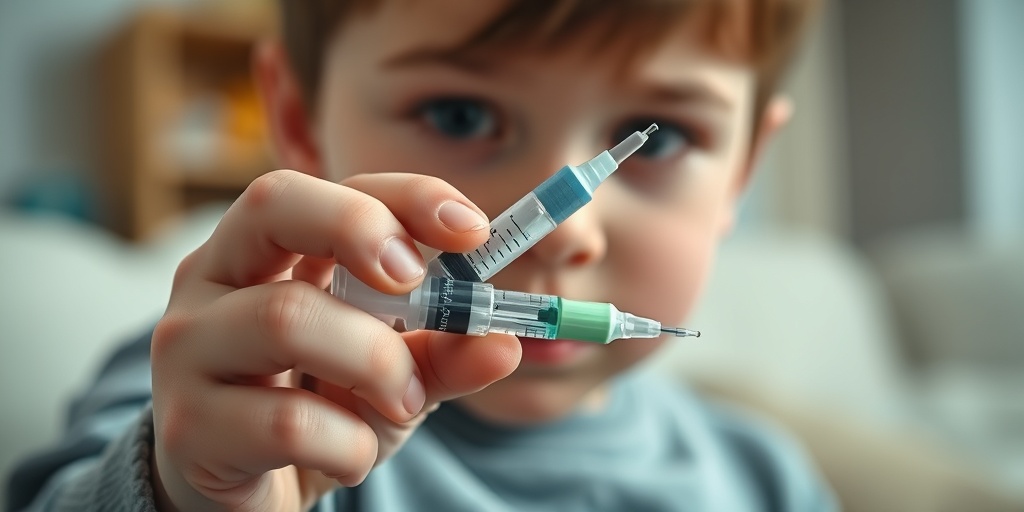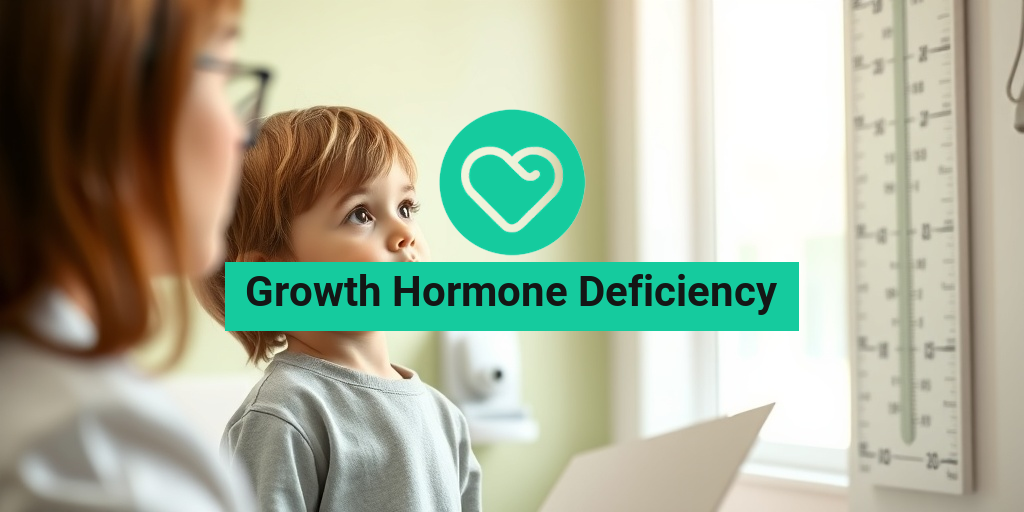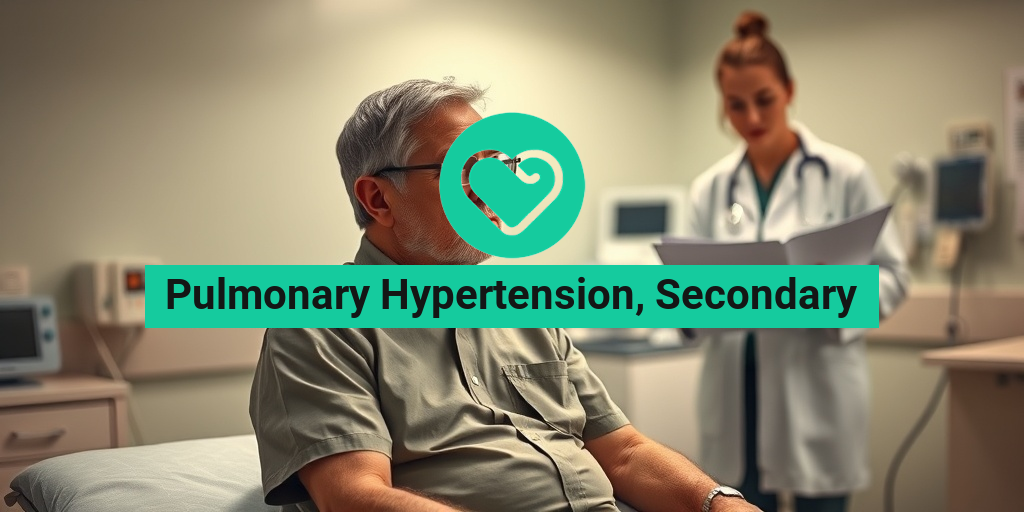What Is Growth Hormone Deficiency?
Growth Hormone Deficiency (GHD) is a medical condition characterized by insufficient production of growth hormone (GH) by the pituitary gland. This hormone plays a crucial role in growth, metabolism, and overall health. GHD can occur in both children and adults, leading to a variety of physical and psychological effects.
Understanding Growth Hormone
Growth hormone is essential for stimulating growth and cell reproduction. In children, it is vital for normal physical development, while in adults, it helps maintain muscle mass, bone density, and overall metabolic health. When the body does not produce enough GH, it can lead to significant health issues.
Causes of Growth Hormone Deficiency
There are several reasons why someone might experience GHD:
- Genetic Factors: Some individuals may inherit conditions that affect the pituitary gland’s ability to produce growth hormone.
- Brain Injuries: Trauma to the head or brain tumors can damage the pituitary gland.
- Radiation Therapy: Treatments for certain cancers can impact hormone production.
- Chronic Illnesses: Conditions such as kidney disease or Turner syndrome can also lead to GHD.
Symptoms of Growth Hormone Deficiency
The symptoms of Growth Hormone Deficiency can vary significantly between children and adults. Recognizing these symptoms early can lead to timely diagnosis and treatment.
Symptoms in Children
In children, GHD can manifest in several ways:
- Short Stature: Children with GHD often do not grow at the expected rate, leading to significantly shorter height compared to peers.
- Delayed Puberty: GHD can delay the onset of puberty, affecting physical development.
- Increased Body Fat: Children may have a higher percentage of body fat, particularly around the abdomen.
- Immature Appearance: A child with GHD may appear younger than their actual age due to delayed growth.
Symptoms in Adults
In adults, the symptoms of GHD can be more subtle but equally impactful:
- Decreased Muscle Mass: Adults may experience a reduction in muscle strength and mass.
- Increased Fatigue: Chronic fatigue and low energy levels are common complaints.
- Emotional Changes: GHD can lead to mood swings, anxiety, and depression.
- Reduced Bone Density: Adults with GHD are at a higher risk for osteoporosis and fractures.
- Impaired Quality of Life: Overall well-being may decline, affecting daily activities and social interactions.
Diagnosis and Testing
If you suspect that you or your child may have Growth Hormone Deficiency, it is essential to consult a healthcare professional. Diagnosis typically involves:
- Medical History Review: A thorough examination of growth patterns and symptoms.
- Growth Hormone Testing: Blood tests to measure hormone levels, often conducted after exercise or during sleep.
- Imaging Studies: MRI scans may be used to assess the pituitary gland’s structure.
For more detailed information and resources on GHD, consider visiting Yesil Health AI, where you can find evidence-based health answers tailored to your needs.
Recognizing the signs and symptoms of Growth Hormone Deficiency is crucial for effective management and treatment. If you or someone you know is experiencing these symptoms, don’t hesitate to seek professional advice. Early intervention can make a significant difference in health outcomes! 🌟

Causes of Growth Hormone Deficiency
Growth Hormone Deficiency (GHD) occurs when the pituitary gland does not produce enough growth hormone, which is crucial for growth, metabolism, and overall health. Understanding the causes of GHD is essential for effective diagnosis and treatment. Here are some of the primary causes:
Genetic Factors
Some individuals may inherit conditions that affect the production of growth hormone. Genetic mutations can lead to congenital GHD, where the body is unable to produce sufficient amounts of growth hormone from birth. Conditions such as Turner syndrome and Prader-Willi syndrome are examples of genetic disorders associated with GHD.
Brain Injuries and Tumors
Trauma to the brain, particularly in the area of the pituitary gland, can disrupt hormone production. This includes injuries from accidents or surgeries. Additionally, tumors in or around the pituitary gland can interfere with its function, leading to a deficiency in growth hormone. These tumors can be benign or malignant and may require medical intervention.
Radiation Therapy
Individuals who have undergone radiation therapy for brain tumors or other conditions may experience damage to the pituitary gland, resulting in GHD. The radiation can impair the gland’s ability to produce hormones, including growth hormone, leading to various health issues.
Chronic Illnesses
Chronic illnesses, such as kidney disease or severe malnutrition, can also contribute to growth hormone deficiency. These conditions can affect the body’s overall hormone balance and lead to decreased production of growth hormone. In children, prolonged illness can significantly impact growth and development.
Idiopathic Causes
In some cases, the exact cause of growth hormone deficiency remains unknown, which is referred to as idiopathic GHD. This can be particularly challenging for healthcare providers, as it complicates diagnosis and treatment. Ongoing research aims to uncover the underlying mechanisms of idiopathic GHD.
Risk Factors for Growth Hormone Deficiency
Identifying the risk factors associated with Growth Hormone Deficiency can help in early detection and management. Here are some key risk factors to consider:
Age
While GHD can occur at any age, it is more commonly diagnosed in children. However, adults can also experience growth hormone deficiency, often as a result of pituitary disorders or other health issues. In adults, GHD is sometimes referred to as adult-onset growth hormone deficiency.
Family History
A family history of growth hormone deficiency or related endocrine disorders can increase the likelihood of developing GHD. If there are known genetic conditions in the family, it is essential to discuss these with a healthcare provider, especially when considering family planning.
Previous Medical Conditions
Individuals with a history of pituitary gland disorders, brain tumors, or significant head trauma are at a higher risk for developing GHD. Additionally, those who have undergone treatments that affect the pituitary gland, such as surgery or radiation, should be monitored for signs of hormone deficiencies.
Obesity
Obesity can influence hormone levels in the body, including growth hormone. Excess body fat, particularly around the abdomen, can lead to hormonal imbalances that may contribute to GHD. Maintaining a healthy weight through diet and exercise is crucial for overall hormonal health.
Gender
Research indicates that males may be at a slightly higher risk for growth hormone deficiency compared to females. This difference may be attributed to hormonal variations and the prevalence of certain genetic conditions that affect growth hormone production.
Understanding the causes and risk factors of Growth Hormone Deficiency is vital for early diagnosis and effective treatment. If you or someone you know is experiencing symptoms related to growth hormone deficiency, it is important to consult a healthcare professional for a comprehensive evaluation and appropriate management. 🩺

Diagnosis of Growth Hormone Deficiency
Diagnosing Growth Hormone Deficiency (GHD) can be a complex process, as it often requires a combination of clinical evaluation, medical history, and specific tests. This condition can affect both children and adults, leading to various symptoms that may not always be immediately linked to hormone levels. Understanding the diagnostic process is crucial for timely and effective treatment.
Clinical Evaluation
The first step in diagnosing GHD typically involves a thorough clinical evaluation. Healthcare providers will assess the patient’s symptoms, which may include:
- Short stature in children
- Increased body fat
- Decreased muscle mass
- Fatigue and low energy levels
- Delayed puberty
For adults, symptoms may include:
- Reduced strength and stamina
- Increased body fat, particularly around the abdomen
- Decreased quality of life
- Depression or anxiety
During the evaluation, the doctor will also take a detailed medical history, including any previous illnesses, injuries, or treatments that could affect hormone levels.
Growth Hormone Stimulation Tests
Once a clinical evaluation is complete, the next step often involves growth hormone stimulation tests. These tests measure the body’s ability to produce growth hormone in response to specific stimuli. Common tests include:
- Arginine Stimulation Test: This test involves administering arginine, an amino acid that stimulates growth hormone release.
- Insulin Tolerance Test: This test checks how the body responds to insulin, which should trigger growth hormone release.
- Glucose Suppression Test: In this test, glucose is administered to see if it suppresses growth hormone levels, as it normally should.
These tests are usually conducted in a controlled environment, often in a hospital or specialized clinic, to ensure accurate results.
Imaging Studies
In some cases, imaging studies such as MRI scans may be necessary to check for abnormalities in the pituitary gland, which is responsible for producing growth hormone. This is particularly important if there are signs of a tumor or other structural issues that could be affecting hormone production.
Interpreting Results
After conducting the necessary tests, healthcare providers will interpret the results to determine if a diagnosis of Growth Hormone Deficiency is appropriate. A diagnosis is typically confirmed if the tests show consistently low levels of growth hormone production.
Treatment Options for Growth Hormone Deficiency
Once diagnosed, Growth Hormone Deficiency can be effectively managed through various treatment options. The goal of treatment is to restore normal growth hormone levels, alleviate symptoms, and improve overall quality of life.
Growth Hormone Replacement Therapy
The primary treatment for GHD is growth hormone replacement therapy. This involves the administration of synthetic growth hormone, which can help to:
- Increase height in children
- Improve muscle mass and strength in adults
- Reduce body fat
- Enhance overall energy levels and quality of life
Growth hormone is typically administered via daily injections, and the dosage will vary based on the individual’s age, weight, and specific needs. Regular follow-ups with healthcare providers are essential to monitor progress and adjust dosages as necessary.
Monitoring and Adjustments
After starting treatment, patients will undergo regular monitoring to assess the effectiveness of the therapy. This may include:
- Periodic blood tests to measure growth hormone levels
- Height and weight measurements for children
- Assessment of body composition and physical performance for adults
Adjustments to the treatment plan may be necessary based on these evaluations to ensure optimal results.
Addressing Underlying Conditions
In some cases, Growth Hormone Deficiency may be secondary to other medical conditions, such as tumors or hormonal imbalances. Treating these underlying issues can sometimes alleviate the deficiency. For example, if a tumor is identified, surgical intervention or radiation therapy may be required.
Supportive Therapies
In addition to hormone replacement therapy, supportive therapies such as nutritional counseling, physical therapy, and psychological support can play a vital role in managing GHD. These therapies can help improve overall health and well-being, making it easier for individuals to cope with the challenges associated with the condition.
In conclusion, diagnosing and treating Growth Hormone Deficiency involves a comprehensive approach that includes clinical evaluation, specialized testing, and tailored treatment plans. With the right support and management, individuals with GHD can lead fulfilling lives. 🌟

Living with Growth Hormone Deficiency
Living with Growth Hormone Deficiency (GHD) can present unique challenges, whether it affects children or adults. This condition occurs when the pituitary gland does not produce enough growth hormone, leading to various physical and emotional symptoms. Understanding how to manage GHD is crucial for improving quality of life.
Understanding the Symptoms
The symptoms of growth hormone deficiency can vary significantly based on age. In children, the most noticeable signs include:
- Short stature: Children may not grow at the expected rate compared to their peers.
- Delayed puberty: There may be a noticeable delay in the onset of puberty.
- Increased body fat: Children with GHD often have a higher percentage of body fat, particularly around the abdomen.
In adults, the symptoms can be more subtle but equally impactful:
- Fatigue: A persistent feeling of tiredness can affect daily activities.
- Decreased muscle mass: Adults may notice a reduction in muscle strength and mass.
- Emotional changes: Anxiety and depression are common among adults with GHD.
Diagnosis and Testing
Diagnosing growth hormone deficiency typically involves a combination of clinical evaluation and specific tests. The growth hormone deficiency test is crucial, often conducted through a stimulation test that measures how well the pituitary gland produces growth hormone. Additionally, doctors may use imaging tests, such as MRI, to check for abnormalities in the pituitary gland.
Managing Growth Hormone Deficiency
Management of GHD often includes hormone replacement therapy, which can significantly improve symptoms and overall quality of life. Here are some common approaches:
- Growth hormone therapy: This involves regular injections of synthetic growth hormone, which can help restore normal growth patterns in children and improve energy levels and body composition in adults.
- Nutrition and exercise: A balanced diet and regular physical activity can help manage symptoms and improve overall health.
- Emotional support: Counseling or support groups can be beneficial for individuals coping with the emotional aspects of GHD.
Future Outlook for Growth Hormone Deficiency
The future outlook for individuals with Growth Hormone Deficiency is promising, thanks to advancements in medical research and treatment options. As awareness of GHD grows, so does the potential for improved diagnosis and management strategies.
Advancements in Treatment
Recent developments in growth hormone deficiency diagnosis and treatment are paving the way for more personalized approaches. Researchers are exploring:
- New formulations: Innovations in drug delivery systems, such as long-acting growth hormone therapies, may reduce the frequency of injections.
- Genetic therapies: Future treatments may involve gene therapy to address the underlying causes of GHD.
Awareness and Education
Increased awareness about GHD is crucial for early diagnosis and intervention. Educational initiatives aimed at healthcare providers and the public can help recognize the signs of GHD sooner, leading to timely treatment. This is particularly important for growth hormone deficiency in children, as early intervention can significantly impact growth and development.
Quality of Life Improvements
With effective management, individuals with GHD can lead fulfilling lives. Ongoing research into the psychological and physical impacts of GHD is essential for developing comprehensive care strategies. As more is understood about the condition, the potential for improved outcomes continues to grow.
In conclusion, while living with growth hormone deficiency presents challenges, advancements in treatment and increased awareness offer hope for a brighter future. 🌟

Frequently Asked Questions about Growth Hormone Deficiency
What is Growth Hormone Deficiency?
Growth Hormone Deficiency is a medical condition characterized by insufficient production of growth hormone (GH) by the pituitary gland. This deficiency can lead to various health issues, including stunted growth in children and metabolic problems in adults.
What are the symptoms of Growth Hormone Deficiency in children?
In children, symptoms of Growth Hormone Deficiency may include:
- Short stature compared to peers
- Delayed puberty
- Increased body fat
- Decreased muscle mass
- Immature facial features
How is Growth Hormone Deficiency diagnosed?
The diagnosis of Growth Hormone Deficiency typically involves:
- Medical history review
- Physical examination
- Growth hormone stimulation tests
- Blood tests to measure hormone levels
What is the treatment for Growth Hormone Deficiency?
Treatment for Growth Hormone Deficiency usually includes:
- Growth hormone replacement therapy
- Regular monitoring of growth and hormone levels
- Addressing any underlying health issues
Can adults have Growth Hormone Deficiency?
Yes, Growth Hormone Deficiency in adults can occur and may lead to symptoms such as:
- Fatigue
- Increased body fat
- Decreased muscle mass
- Reduced quality of life
What is the ICD-10 code for Growth Hormone Deficiency?
The ICD-10 code for Growth Hormone Deficiency is E23.0. This code is used for billing and documentation purposes in healthcare settings.
How is Growth Hormone Deficiency tested?
Testing for Growth Hormone Deficiency typically involves:
- Blood tests to measure growth hormone levels
- Stimulation tests to assess the pituitary gland’s ability to produce growth hormone
Is there a growth chart for children with Growth Hormone Deficiency?
Yes, there are specific growth charts designed for children with Growth Hormone Deficiency. These charts help healthcare providers monitor growth patterns and assess treatment effectiveness.
Can Growth Hormone Deficiency affect athletic performance?
Yes, Growth Hormone Deficiency can impact athletic performance due to decreased muscle mass and increased fatigue. Treatment may help improve physical capabilities.
What is the long-term outlook for individuals with Growth Hormone Deficiency?
With appropriate treatment, individuals with Growth Hormone Deficiency can lead healthy lives. Regular monitoring and adjustments to therapy can help manage symptoms effectively.




